- Home
- Charles L. Grant
The Curse Page 15
The Curse Read online
Page 15
She called the hospital twice, and twice received the same cautious answer: Peg was resting well, still in the oxygen tent, still unconscious. Her temperature had remained constant throughout the night and morning, and though she was being fed intravenously, she appeared to be holding her own. Against what, Terry demanded, and the doctor—the Flaherty Syd had spoken to—stammered until she forced him to admit he hadn't the slightest idea, that the closest he could presently come was a combination of pneumonia and exhaustion.
Syd returned as she finished her third cup, and when she ran out of the kitchen, he was dumping an armful of books onto the coffee table.
"About time," he said, easing himself to the carpet and grabbing for the nearest volume. "I thought you were going to sleep all day. A hell of a way to spend my vacation, if you ask me." Then he sobered. "Are you all right, angel?"
She hurried to his side, kissed him soundly on the cheek, and settled next to him, her eyes confused by the display of titles before her. "Give," she said. "What the hell is all of this?"
"Well. . . ." He leaned back on his palms. "I got to thinking this morning that you weren't going to be much company today, and I really didn't relish watching all those game shows and soap operas on the boob tube, so I read the article again and decided to raid the library."
Article. The scene on the porch flickered before her, made her realize how hard she'd been trying to bury its connections. "But I already went down there. I told you that. There wasn't anything."
"Not on the so-called reservation, which we now know is a hoax. But I wanted to know more about Tecumseh. You know, blood lines, legends, stuff like that."
"You mean you're going to take all this crap seriously? Ghost dances, magical potions and shit like that?"
"Absolutely not," he said. "At least, not literally."
She rolled her eyes toward the ceiling and prayed for a miracle of instant comprehension. Then she picked up one of the books and thumbed through it. "Nice pictures," she said. "Now what in hell are you talking about?"
"What I'm talking about is that I think that while you and I, being people of the world and products of the big city—"
"Come on, Syd!"
"No, wait a minute, that's important. Just button up and listen." He let himself fall the rest of the way to the floor and made a pillow of his hands. "We come from the city; you see, and that gives us a big disadvantage when it comes to dealing with rural types. It's like a kind of culture shock, going to another country almost and having to learn entirely new habits, customs, idioms, things like that."
"I get it, but we haven't done too badly."
"No, we haven't. But, see, we're still more inclined to play the role of the cosmopolitan sophisticate and dismiss out of hand every creepy-sounding story we hear as being the product of a deranged mind."
She lay on her side beside him, frowning. "But I never said Denver or the others were deranged, Syd."
"And I never said you did. What I am saying, see, is that we have to consider the stories and forget the folk, keeping in mind that they might just believe."
She thought for a minute, tracing channels through the carpet's nap. "You mean, we have to assume that Denver might believe in this, or something like it, and then do our thing. As though we were country people instead of city bred."
He grinned broadly and patted her head. "Now you've got it, kiddo. We have to shake off all that smog and mugging veneer and really get down to what counts out here. And on The Lane, what counts is that the McIntyres are not normal people. They have, for some reason, developed this reservation thing probably to keep busybodies like us from finding out the truth about what's really happened here."
"And what," she said, "is this awful truth you're hinting at?"
"If I knew that, angel, I wouldn't be lying here breaking my neck on the floor. I'd be out there doing something about it."
"So. . . "
"So we read what we can in the books, and wait for divine inspiration to strike our pates with a plan of decisive action. That's what." He righted himself and helped her to sit. "And remember, we are not looking for ghosts or voodoo or anything like that. We are looking for explanations we can understand so we can deal with . . . whatever."
He began, then, to check all the indexes, summarily dismissing some without bothering to read, others he dropped into his lap and hers for future reference. She watched him without staring, suspecting that all of this nonsense was but a ploy to divert her attention from Peg's condition. There was, then, a moment when she felt she should be at her sister's side, but the waiting obviously wouldn't solve anything, would produce nothing but compounded anxiety. Reluctantly, she tried to fall into Syd's scheme, reading until her eyes blurred and she couldn't tell one Indian from another, one tribal custom from its brother. Neither could she unearth any mention at all of the booklet's legend concerning Tecumseh's alleged return.
The dinner hour passed without her suggesting a meal. She stood, stretched, looked down at Syd following a chart with his finger, and she wondered why he hadn't proposed a simple confrontation with the McIntyres; legends and ghosts and warring dead men notwithstanding, there still might be that all too real and perfectly innocuous explanation. But she hesitated to broach the subject. She herself wouldn't go near the house, and she readily admitted to a slow but growing fear of the Indian. The power of that understated strength beneath the surface she had no wish to provoke. Once unmasked, he might become violent, or worse under the circumstances, turn the neighborhood against her. She looked around the room and realized that Number Three had become her first permanent home since she'd left the nest her father had built; the apartments didn't count—there was too much of the transient about them. But this house was something she would not, could not let Denver drive her from. No matter what he was.
"Damn," said Syd, crawling back to his chair and resting his head against the cushion. "Nothing. Not a blessed thing."
"Well, what did you expect? A ten-page revelation?"
"No, but I at least hoped to find something more about what happened to that damned Indian. But the accounts are so conflicting! He was shot by a wounded soldier, he vanished into cannon fire and never returned, he vanished—period. They took his body, they buried him where he fell, they burned it, they stole it—Jesus Christ, why couldn't they have had television or something back then so we'd know more!"
She shared his frustration, but refused to allow it to dampen her mood; the impending storm was doing well enough in that regard. "Did you see anything about the dolls? I didn't."
Closing his eyes, he shook his head. "Zilch. Crap. Terry, sometimes I wonder if those things ever existed."
"Well, you sure as hell don't have to worry about that." She hurried down the hall, paused when a flicker-blue burst of lightning snapped from the bedroom. She waited until the thunderclap had grumbled over the roof, then pulled out the dresser drawer and fumbled beneath her lingerie. Frowned. Pulled open the next drawer down and pulled out handkerchiefs and underwear. Then she put hands on her hips. All right, what the hell did you do with it, Jerk? Again she searched through the two drawers, moved to those she knew for a fact didn't contain the doll she'd uncovered in Alec's house.
"Syd," she finally called. "Where'd you put the doll I had in here in my dresser drawer?"
His answer was muffled, but the sense clear enough.
"The study," she muttered, and rushed into her room to scatter the books and papers on her desk. She yanked boxes from the closet shelf, shoved aside volumes and manuscript notebooks on the bookcase. Nothing. She jerked up the shade in hopes of adding more light before remembering the sun had long since gone. Again lightning, and she turned to leave, saw the easel and couldn't help a startled scream.
Syd shouted and in a minute was at her side. She pointed to the canvas on the frame. "Well?" he said, leaning closer to stare and squint. "What's the matter?"
Swallowing hard, she felt her hands fluttering nervously, around her face
and neck. "I didn't put it there, Syd. I haven't touched a piece of charcoal for nearly two days."
A faintly sketched picture; a field, a plain, in black and white. Smudged figures on the horizon. No sun. The marker was half hidden, hand grasping a tomahawk in the foreground. There was no writing on it that she could see, but she recognized its outline and its slight cant to the left.
"It reminds me of something," he said. "Damnit, I hate things like that, when you think you know something but you can't put—"
"My dream," she whispered. "When I went sleepwalking. And the other night. That one, too."
"Damn, you're right, angel. When you do this, anyway? It's not very good, if you don't mind me saying so."
"I didn't do it."
He looked down at her. "Well, of course you did! Who else uses this room but you?"
"I said I didn't do it." Her voice was firm, though she had no idea how she managed it. "I haven't touched this canvas since the other day, Syd."
He gestured weakly. "Maybe you started it and forgot about it because of Peg."
"I don't forget things I draw. And certainly not something of those dreams."
The second dream had ended on an easel, she recalled, but that picture was darker, much darker and more complete. This was merely a series of slashes in preparation for something more elaborate. "Out" she said suddenly, and pulled him back into the living room.
"The doll," Syd said, annoyed at her behavior. "You must have misplaced it."
"Damnit, Syd, stop being so bloody calm! I didn't misplace it. I know exactly where I put it, and it's not there now."
He looked at her steadily, neither belief nor doubt in his expression. As though trying to decide, she thought, and waited instead of cursing.
"All right," he said tightly. "This has gone far enough." He strode to the closet and pulled out his raincoat. "It's time this bullshit came to an end. Lies about reservations are one thing, but coming into my house is quite another."
"What are you going to do?" And she knew it was a stupid question before it came out.
"I am going to pay a visit to our local wigwam and find out just what the hell that old man has in for us. I still say Peg was drugged, you know, no matter what those quacks at the hospital think."
She reached for her coat but his fists pinned her wrists. "No, you're not going." When she opened her mouth to protest, he kissed her, hard, and eased her back into the room. "You stay here. Someone has to wait for a call from Flaherty."
She was torn, then, and mad enough to cry. He kissed her again and left, and she hesitated only a moment before running to the bedroom to grab a light sweater and race back to the porch. Syd had already started across the street, angling away from McIntyre's house because of the wind that gusted toward the meadow. She saw him take the steps two at the time, yank back the screen door and press the bell. She saw the door open and Syd pushed his way in. The door closed immediately behind him. The light went on in the front room.
Be careful, she whispered silently. I don't need you to be another Custer, you big dope.
Chapter XI
The temperature dropped. The sweater, draped around her shoulders, flapped as the wind cut across the yard and whistled faintly under the eaves. Thunder was almost constant now, and lightning bolts illuminated The Lane with such rapidity that she was reminded of a silent movie flickering on a black screen. All that was missing was the heroine fleeing, and a piano.
When the chill became too much, she ducked back inside and turned on the porch light. Then she switched off the lamp and pulled open the drapes. She stared for a moment at the walk and saw patches of brown spreading rapidly on the concrete, expanding until they were joined and exploding in gleaming, short-lived fountains. Puddles formed where the drainage by the hedge was inadequate, and the street became a stream, the air bleached white with rain. A car hissed to a stop by the driveway. Terry waved a hand as though it would sweep the window clear of water, and the car bumped over the curb, turned and sped away. She pressed her cheek against the glass to watch as it paused at the corner, its taillights like two animals, rats, trapped in a hunt. The image was retained as she returned her gaze to the McIntyre house, and its too obvious symbolism made her deride her own imagination and close the drapes.
"Okay," she said, clapping her hands once and wiping them on her hips, "let's get a little food into you so you won't drop of starvation at this critical juncture of your nightmare."
Bitter, old girl, she thought as she groped past the furniture obstacles and turned on the kitchen light. And unnecessary. You should be pleased you have a white knight willing to charge out in all kinds of weather to do your dirty work for you.
She set out a frying pan and dropped butter into it, then placed two breasts of chicken into the bottom and leaned against the stove to listen to the storm counterpoint the simmering, spattering meat. Remembering a vegetable, she set a pot of water on the burner to boil, before reaching for the telephone.
The nurse she had spoken to the day before remembered her instantly and, though she claimed to be breaking all standing rules, told her Peg had taken a slight turn for the better. Terry put out a hand for something to hold onto and inadvertently grabbed the handle of the pot instead. The water, pot, and lid slid off the stove onto the floor, and it was a full two minutes before she was able to convince the nurse that her curses were not aimed at the competency of the hospital's staff.
"What do you mean by better?" she asked, tucking the receiver between neck and shoulder while she mopped up the water with a hand towel. "Is she awake, or what? Why didn't you call? Doctor Flaherty promised he would call as soon as she woke up."
"She isn't awake," the nurse said calmly. "What I meant was—you didn't burn yourself, did you? Those things can be nasty if you don't treat them right away."
"No, I didn't burn myself," Terry said impatiently.
"Oh, good. Well, what I meant was that your sister's temperature had decreased somewhat—not much, but enough so that the doctor is very encouraged. She's still, uh, asleep and still in the oxygen tent, but I would guess that they'll be taking her out by morning if her temperature continues to drop. But please, Mrs. Guiness, don't tell anyone I said anything. You know how they are about gabbing like this."
Terry thanked the nurse profusely, promising everything short of her future royalties in return for the welcome bulletin. It would, at last, be all right. The world, once lost, was back on the track and when Syd returned from straightening Denver out, they would have plenty to celebrate. She considered means, then pulled two wine glasses from the cabinet over the refrigerator and put them into the freezer, noting the time so they wouldn't become too brittle. Fifteen minutes, she thought, would be ample time for Syd to get back and the glasses to be ready. She hummed several off-key notes, heard herself and shifted to a whistling. She didn't even begrudge the time necessary to complete the floor's cleaning. It was, she thought, one of the most pleasant chores she had had to perform in a very long time.
And when the telephone rang, she sang the greeting. Static.
She took a shuddering breath of recognition and slammed the phone onto its hook, shaking her head and backing away from the wall. No, she told it, this wasn't going to happen again! Not now, not when Peg's getting well and Syd's getting the steam off his chest. I am not going to allow it. I will not permit it.
The phone rang. Once. Twice. It paused. Rang. The sound drowning the thunder and the wash of rain slapping against the kitchen window.
You're a big girl, Terry, aren't you? She pulled at her shirt and approached the instrument, ignoring the sudden weakness in her knees and ankles, staring at the white-faced dial as though the look would silence it. When she reached out, she saw the tremors and slapped her fingers against her side, grabbed the receiver and held it at arm's length. She strained, could hear nothing, no man's voice trying to bridge the distance. Slowly she brought the earpiece closer.
There was static that jumped when lightnin
g bleached the room's shadows. Now the familiar surge of air she had once attributed to the wind. There was no use talking; she knew she wouldn't be answered, at least not by anyone she knew. Deeper breaths, now, to calm herself. The initial shock had passed, anger had been fleeting and only attentive curiosity made her stand there, listening, waiting for what she halfprayed would not come.
One word: Theresa!
The earpiece pressed warmly against her hair. She felt rather than heard something behind the name, a throbbing unidentifiable, pulsing as though she were listening to blood coursing through a thick open vein. Closer, and it was a heartbeat.
Again: Theresa.
"Who is it?" she demanded in spite of herself, and ashamed for the tears that made her voice whispering harsh. "Who is it? What do you want? Who are you, damnit, who are you?"
Only: Theresa.
And the throbbing became louder, erasing its own image, resolving itself into a faint but unmistakable chorus of rhythmic voices that rose in unison to whisper over the wind and the static: Theresa.
She dropped the receiver. It dangled on its curled cord, thumping against the wall, spinning, and, thumping again. The noise filtered into the air, filling the room, and she ran from it, pursued by it until she ducked into her study and slammed the door behind her, leaning her back against it. She braced, sobbing, for the heavy blow that would splinter the wood and send her sprawling.
The curtains were still open, the shade full up. The lightning was trapped in the droplets that clung to the screen outside the window, miniature storms in themselves trembling and trapped until the wind shook around the house and they were punched loose, only to be replaced by others equally gleaming, equally trapped.
Terry moved to pull the curtains and stumbled into the easel. Her shoulder stung where it met a corner of the sharp-edged frame, and she rubbed at it, sobbing still, while one hand fumbled for the loop of the shade. She yanked it and a screeching grated her nerves and made her shiver. Then she pulled the curtain draw and leaned against the wall.

![[Oxrun Station] The Orchard Read online](http://i1.bookreadfree.com/i/03/17/oxrun_station_the_orchard_preview.jpg) [Oxrun Station] The Orchard
[Oxrun Station] The Orchard![Riders in the Sky - [Millennium Quartet 04] Read online](http://i1.bookreadfree.com/i/03/20/riders_in_the_sky_-_millennium_quartet_04_preview.jpg) Riders in the Sky - [Millennium Quartet 04]
Riders in the Sky - [Millennium Quartet 04]![Chariot - [Millennium Quartet 03] Read online](http://i1.bookreadfree.com/i/03/19/chariot_-_millennium_quartet_03_preview.jpg) Chariot - [Millennium Quartet 03]
Chariot - [Millennium Quartet 03] The Universe of Horror Volume 1: The Soft Whisper of the Dead (Neccon Classic Horror)
The Universe of Horror Volume 1: The Soft Whisper of the Dead (Neccon Classic Horror)![[Oxrun Station] Dialing The Wind Read online](http://i1.bookreadfree.com/i/03/19/oxrun_station_dialing_the_wind_preview.jpg) [Oxrun Station] Dialing The Wind
[Oxrun Station] Dialing The Wind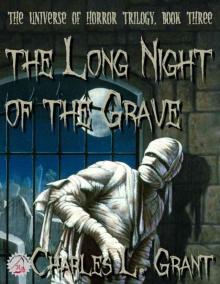 The Universe of Horror Volume 3: The Long Night of the Grave (Neccon Classic Horror)
The Universe of Horror Volume 3: The Long Night of the Grave (Neccon Classic Horror) The Grave - An Oxrun Station Novel (Oxrun Station Novels)
The Grave - An Oxrun Station Novel (Oxrun Station Novels)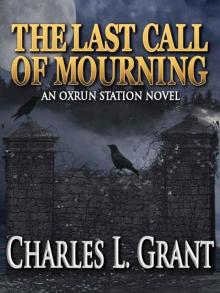 The Last Call of Mourning - An Oxrun Station Novel (Oxrun Station Novels)
The Last Call of Mourning - An Oxrun Station Novel (Oxrun Station Novels) The Complete Short Fiction of Charles L. Grant, Volume IV: The Black Carousel
The Complete Short Fiction of Charles L. Grant, Volume IV: The Black Carousel The Bloodwind - An Oxrun Station Novel (Oxrun Station Novels)
The Bloodwind - An Oxrun Station Novel (Oxrun Station Novels) The Curse
The Curse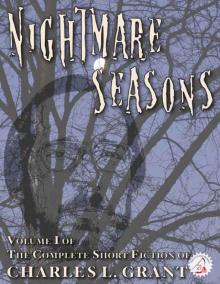 The Complete Short Fiction of Charles L. Grant Volume 1: Nightmare Seasons (Necon Classic Horror)
The Complete Short Fiction of Charles L. Grant Volume 1: Nightmare Seasons (Necon Classic Horror) The Universe of Horror Volume 2: The Dark Cry of the Moon (Neccon Classic Horror)
The Universe of Horror Volume 2: The Dark Cry of the Moon (Neccon Classic Horror) Watcher: Based on the Apocalypse (World of Darkness : Werewolf)
Watcher: Based on the Apocalypse (World of Darkness : Werewolf)![[Oxrun Station] The Bloodwind Read online](http://i1.bookreadfree.com/i/03/25/oxrun_station_the_bloodwind_preview.jpg) [Oxrun Station] The Bloodwind
[Oxrun Station] The Bloodwind The Orchard
The Orchard Night Songs
Night Songs Shadows 3
Shadows 3![Symphony - [Millennium Quartet 01] Read online](http://i1.bookreadfree.com/i1/04/02/symphony_-_millennium_quartet_01_preview.jpg) Symphony - [Millennium Quartet 01]
Symphony - [Millennium Quartet 01] The Hour of the Oxrun Dead (Necon Classic Horror)
The Hour of the Oxrun Dead (Necon Classic Horror)![In the Mood - [Millennium Quartet 02] Read online](http://i1.bookreadfree.com/i1/03/31/in_the_mood_-_millennium_quartet_02_preview.jpg) In the Mood - [Millennium Quartet 02]
In the Mood - [Millennium Quartet 02] The Complete Short Fiction of Charles L. Grant Volume 3: Dialing the Wind (Neccon Classic Horror)
The Complete Short Fiction of Charles L. Grant Volume 3: Dialing the Wind (Neccon Classic Horror)![[Oxrun Station] The Last Call of Mourning Read online](http://i1.bookreadfree.com/i2/04/05/oxrun_station_the_last_call_of_mourning_preview.jpg) [Oxrun Station] The Last Call of Mourning
[Oxrun Station] The Last Call of Mourning The Pet
The Pet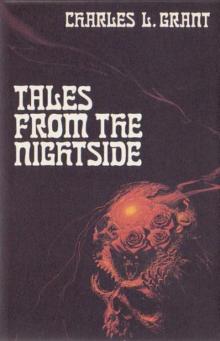 Tales from the Nightside
Tales from the Nightside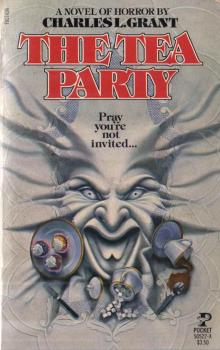 The Tea Party - A Novel of Horror
The Tea Party - A Novel of Horror The Complete Short Fiction of Charles L. Grant Volume 2: The Orchard (Necon Classic Horror)
The Complete Short Fiction of Charles L. Grant Volume 2: The Orchard (Necon Classic Horror) Whirlwind
Whirlwind Jackals
Jackals The Sound of Midnight - An Oxrun Station Novel
The Sound of Midnight - An Oxrun Station Novel